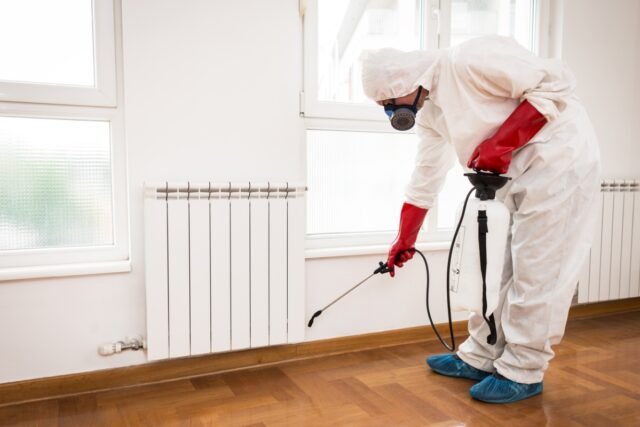Introduction
Pests are more than just a nuisance—they can pose serious health risks, cause property damage, and disrupt everyday life. From termites silently eating away at your wooden structures to rodents contaminating your food and spreading diseases, pest infestations can quickly escalate if not addressed promptly.
That’s where pest control services come in. These professional services use a combination of inspection, treatment, and prevention to eliminate unwanted pests from homes, businesses, and public spaces. In today’s environmentally conscious and health-sensitive world, pest control has become a critical component of property management.
In this detailed guide, we explore what pest control services include, types of pests commonly treated, various methods used, and key factors to consider before hiring a pest control company.
What Are Pest Control Services?
Pest control services are specialized treatments and strategies used to manage, reduce, or completely eliminate pest infestations. These services are provided by trained professionals who assess the property, identify the type and extent of the infestation, and apply appropriate treatments using safe and regulated chemicals or natural solutions.
Professional pest control includes both preventive measures and emergency treatment, depending on the situation.
Common Types of Pests Treated
Pest control companies are equipped to handle a wide range of infestations. Here are the most commonly targeted pests:
1. Termites
- Damage: Wood destruction, structural damage.
- Signs: Hollow-sounding wood, mud tubes, discarded wings.
- Treatment: Soil treatment, bait systems, fumigation.
2. Cockroaches
- Damage: Food contamination, disease carriers.
- Signs: Droppings, egg casings, unpleasant odour.
- Treatment: Gel baits, sprays, growth inhibitors.
3. Rodents (Rats & Mice)
- Damage: Chewed wires, insulation damage, and health risks.
- Signs: Gnaw marks, droppings, scratching sounds.
- Treatment: Traps, poison bait stations, sealing entry points.
4. Ants
- Damage: Food contamination, structural nesting.
- Signs: Trails of ants, visible nests.
- Treatment: Liquid barriers, baiting systems.
5. Mosquitoes
- Damage: Spread of dengue, malaria, and Zika virus.
- Signs: Buzzing sound, itchy bites.
- Treatment: Fogging, larvicide treatment, water source control.
6. Bed Bugs
- Damage: Bites, sleeplessness, allergic reactions.
- Signs: Blood stains on sheets, small black spots, itching.
- Treatment: Heat treatment, insecticides, vacuuming.
7. Fleas & Ticks
- Damage: Irritation to pets and humans, disease carriers.
- Signs: Constant pet scratching, bite marks.
- Treatment: Pet-safe treatments, environmental sprays.
8. Bees, Wasps, Hornets
- Damage: Painful stings, allergic reactions.
- Signs: Visible nests, buzzing.
- Treatment: Nest removal, targeted sprays.
9. Flies
- Damage: Food contamination, disease transmission.
- Signs: Swarms near food or garbage.
- Treatment: Insect light traps, baits, and sanitation improvement.
Types of Pest Control Methods
Pest control companies use a variety of techniques depending on the pest, severity of infestation, and location. These include:
1. Chemical Pest Control
- Involves using pesticides and insecticides.
- Effective for rapid extermination.
- Requires proper handling and post-treatment precautions.
2. Biological Pest Control
- Introduces natural predators or pathogens to control pests.
- Eco-friendly and safe.
- Common in agricultural and outdoor settings.
3. Mechanical Pest Control
- Physical methods like traps, barriers, and devices.
- Used for rodents, birds, and crawling insects.
- Includes rodent traps, fly zappers, and glue boards.
4. Fumigation
- Seals off the space and fills it with fumigant gases.
- Used for large-scale infestations (e.g., termites or warehouse pests).
- Requires temporary evacuation.
5. Heat Treatment
- Uses high temperatures to kill pests like bed bugs.
- Chemical-free and safe for sensitive environments.
- Growing in popularity for residential use.
6. Integrated Pest Management (IPM)
- A holistic and long-term approach combining multiple techniques.
- Focuses on prevention, monitoring, and minimal chemical use.
- Ideal for homes, schools, and environmentally sensitive areas.
Benefits of Hiring Professional Pest Control Services
Many homeowners try DIY pest treatments, but these often offer short-term relief. Here’s why hiring a licensed pest control company is a better solution:
1. Accurate Pest Identification
Professionals identify not just the visible pest, but also locate nests, breeding grounds, and hidden infestations.
2. Customized Treatment Plans
One-size-fits-all rarely works in pest control. Experts tailor the approach based on infestation severity, location, and type.
3. Safe and Regulated Chemicals
Professionals use EPA-approved or environmentally safe chemicals that are less harmful to pets, children, and the environment.
4. Long-Term Prevention
Modern services don’t just kill pests—they implement solutions to prevent re-infestation through sealing, traps, and preventive sprays.
5. Time and Cost Efficiency
Instead of wasting money on over-the-counter products that don’t work, a one-time expert visit can resolve the issue effectively.
6. Peace of Mind
Knowing your home is pest-free lets you sleep better and protects your family’s health.
Services Offered by Pest Control Companies
Most pest control companies provide a mix of one-time services and annual contracts, including:
- Residential pest control
- Commercial pest control (restaurants, offices, warehouses)
- Rodent-proofing and exclusion services
- Pre-construction and post-construction termite treatments
- Mosquito fogging services
- Bed bug treatment packages
- Sanitization and disinfection (post-treatment)
What to Look for When Hiring a Pest Control Company
Choosing the right pest control Lahore is crucial for effective results. Here are important things to consider:
1. License and Certification
Ensure the company is registered and licensed by your local pest control board or municipal body. Certified technicians indicate proper training.
2. Experience and Specialization
Look for a company with several years of experience and proven results, especially if you’re dealing with hard-to-treat pests like termites or bed bugs.
3. Reputation and Reviews
Check Google, Facebook, or Yelp for ratings and customer testimonials. Consistent positive feedback is a good sign.
4. Guarantee or Warranty
Professional companies offer re-treatment guarantees if pests return within a certain period after service.
5. Eco-Friendly Options
Ask if they offer green pest control methods, especially if you have children or pets at home.
6. Transparent Pricing
Request a detailed quote with no hidden charges. Compare at least 2–3 companies before making a decision.
7. Emergency Services
Some infestations require urgent attention. A company that offers same-day or emergency pest control is always a plus.
Conclusion
Pests are more than just a source of irritation—they threaten your health, property, and peace of mind. Whether it’s a minor ant trail or a full-blown termite infestation, hiring a professional pest control service is the most effective way to reclaim your space.
With a wide range of services, modern treatment options, and preventive strategies, pest control companies offer real value to both homeowners and businesses. Just be sure to choose a reputable, certified company that prioritizes safety, customer satisfaction, and long-term results.







